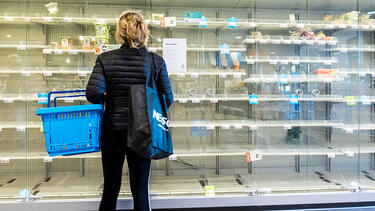Why a Pandemic Leads to Panic Buying
Many of us have faced empty shelves—especially in the toilet paper aisle—as we and millions of fellow citizens prepare for life in the age of COVID-19. We asked Yale SOM’s Nathan Novemsky, an expert in the psychology of judgment and decision-making, for his thoughts on how consumers are behaving during the pandemic and how they’re likely to view companies’ actions in the aftermath.

A shopper confronting empty shelves at a grocery store in Wassenaar, The Netherlands, on March 14, 2020. Photo: Michel Porro/Getty Images.
What are the psychological factors behind the empty shelves in grocery stores?
I think we are seeing a perfect storm of psychological forces. One is scarcity; stores seem to be running out of certain items. We know scarcity makes everything seem more valuable, diamonds being the best example of scarcity driving demand. Another factor is control; consumers feel out of control about many aspects of the pandemic, but they do have control when they choose to stock up on things, so they exercise that control to feel better about the situation. There is tremendous uncertainty, and people worry about regretting not buying something, so this anticipation of possible regret leads them to buy, as regretting buying too much is not something they are too concerned about, compared to the regret of buying too little. Providing stuff can be used to express concern or caring for themselves and their family, so they buy items to show they are trying to keep their family safe. And there are various other factors. Perhaps the best way to reduce this cycle of panic buying is for people to feel like there are downsides to buying too much, such as keeping that stuff from others who need it more. This provides a reason for moderation, which is less likely to come to mind spontaneously as consumers are thinking less about the additive effects of everyone hoarding then they are about the immediate effects of having more stuff for their own family.
How do companies’ actions during a crisis like this change the way they are perceived by consumers?
This is a time when emotions are running high, so both positive steps and missteps are likely to be remembered more than company actions at other times and have a disproportionate effect on people’s attitudes toward those companies. Of course, this requires that consumers are made aware of the actions—ideally in the moment rather than after the crisis, when emotions will be less potent and less likely to drive long-term memories of the actions. It is a great time to express a company’s values in an attention-getting way that will stick with consumers for a long term, especially if its actions are unambiguously selfless and consumer-focused, such as distilleries producing hand sanitizer and giving it away.
Do you expect this experience to change consumer behavior in the longer term?
Yes, but it’s very difficult to predict how. One potential long-term change is similar to how millennials reacted to the 2008–09 recession. They seem to have taken a few long-term lessons from that, such as not trusting banks, and in general they seem skeptical of financial instruments and institutions. There will probably be lasting scars here, but we will not know how that will look until we know what narrative people adopt for this. That narrative could be about China, or about eating unusual animals or even about public heath regulations, like lockdowns and whether they are seen as effective or ineffective.